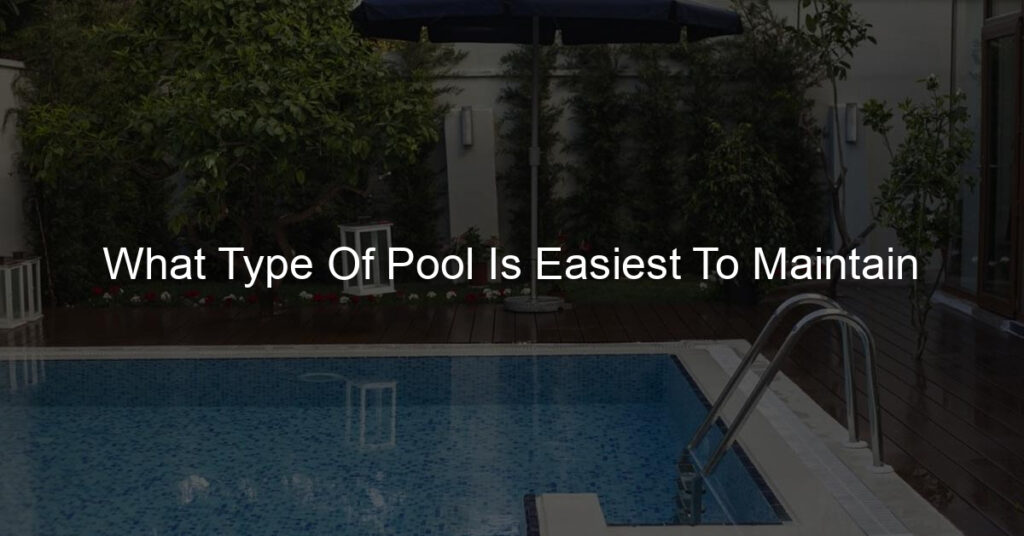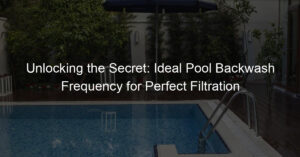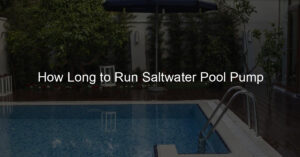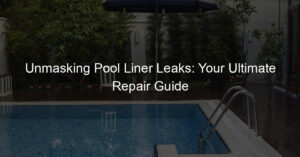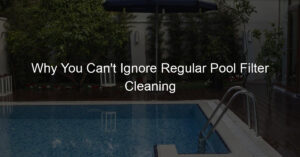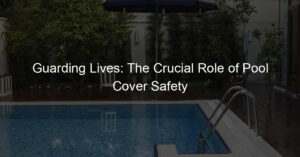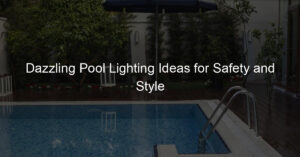Intro
Deciding to own a swimming pool is exciting, but one must also consider the practical side of things: maintenance. Picking the right type of pool is crucial because it significantly affects your future upkeep responsibilities. In this comprehensive guide, you’ll learn about the different types of pools and their respective maintenance needs.
We’ll delve into everything from the basic pool types to more intricate aspects like pool accessories, water chemistry, and even how landscaping can influence your upkeep routine. By the end, you’ll have a solid understanding of which pool type is the easiest to maintain and why.
Understanding the Basics: Different Types of Pools
The main types of pools are concrete, vinyl liner, and fiberglass, each with unique maintenance requirements. Concrete pools, known for their durability and versatility, are popular but require a fair amount of maintenance. Vinyl liner pools, while less expensive initially, can incur higher maintenance costs over time due to liner replacement.
Fiberglass pools are praised for their easy maintenance, but their initial cost is higher. Above-ground and in-ground pools also differ significantly in upkeep needs.
Maintenance Factors to Consider When Choosing a Pool
When choosing a pool, there are several maintenance factors to consider. These include the type of pool, its size and shape, the materials it’s made from, and the filtration system. Each factor influences the level of maintenance required. For instance, larger pools will necessitate more regular cleaning and chemical balancing, and certain shapes might make cleaning more difficult.
Why Choose Fiberglass Pools: Benefits and Maintenance
Fiberglass pools are renowned for their easy maintenance. Their smooth surfaces inhibit algae growth, decreasing cleaning needs. Additionally, fiberglass doesn’t affect water chemistry as much as other materials, meaning less chemical balancing. While they require a higher initial investment, the lower maintenance needs might make it worth considering.

Concrete Pools: Pros, Cons, and Maintenance Requirements
Concrete pools offer great flexibility in design but come with higher maintenance needs. They require regular brushing to prevent algae growth on the porous surfaces. Additionally, the pool’s pH level tends to rise due to the alkaline nature of concrete, necessitating frequent water chemistry checks and adjustments.
Vinyl Liner Pools: Maintenance Expectations and Costs
Vinyl liner pools are initially more affordable but come with unique maintenance challenges. The liners can be punctured, leading to leaks, and they will need to be replaced approximately every 10 years. Moreover, their smooth surfaces make cleaning easier, but they are susceptible to staining, requiring attentive chemical balancing.
Above-Ground Pools vs In-Ground Pools: A Maintenance Comparison
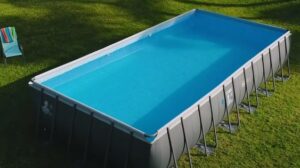
Above-ground pools generally require less maintenance than in-ground pools due to their smaller size and simplified equipment. However, in-ground pools are more durable, and with the right equipment and regular servicing, can also be easy to maintain.
Saltwater Pools: Are They Easier to Maintain?
Saltwater pools are increasingly popular due to their lower chlorine levels, which are gentler on the skin and eyes. However, they require a saltwater generator, which can be expensive to maintain and replace. Plus, while less frequent, chemical balancing is still necessary.
Chlorine Pools Maintenance: What to Expect
Chlorine pools require consistent maintenance, with regular chemical checks to keep the water balanced and safe. Chlorine levels need monitoring daily, and other chemicals like pH, alkalinity, and calcium hardness should be tested weekly. Frequent additions of chlorine or a chlorine alternative are necessary.
Investing in Pool Covers: How They Simplify Pool Maintenance

Pool covers can significantly ease pool maintenance by keeping debris out, reducing evaporation, and maintaining water temperature. This results in less cleaning, water, and energy usage, making them a worthwhile investment for any pool owner.
Automatic Pool Cleaners: An Essential for Easy Maintenance?
Automatic pool cleaners can handle most of the daily cleaning tasks, making pool maintenance easier. While they can be an initial investment, they save time and effort in the long run. There are various types available, including suction, pressure, and robotic cleaners, each suitable for different pool types and needs.
How Regular Professional Servicing Can Ease Pool Maintenance
Regular professional servicing can greatly simplify pool maintenance. Professionals can handle tasks such as deep cleaning, equipment check, and water testing, leaving you to enjoy your pool worry-free. Consider it as a part of your regular pool budget.
Pool Size and Shape: How They Impact Maintenance Efforts
Pool size directly influences maintenance efforts — larger pools require more cleaning and chemicals. The shape also matters as complex shapes with lots of nooks and crannies can make cleaning more challenging. Consider these factors when choosing your pool.
Why Choosing the Right Pool Filter Matters for Easy Maintenance
The pool filter plays a vital role in keeping your pool clean. There are three main types: sand, cartridge, and diatomaceous earth (DE), each with different efficiency levels and maintenance requirements. Choosing the right one can significantly affect your pool’s cleanliness and the effort required to maintain it.
Dealing with Pool Algae: Prevention and Easy Maintenance Tips
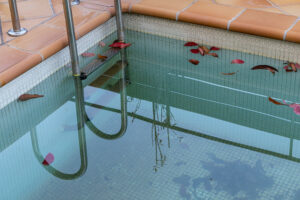
Algae can be a nuisance in any pool, requiring swift action to prevent it from turning your pool green. Regular cleaning, balanced water chemistry, proper filtration, and routine shocking can help prevent algae. If it appears, treat it promptly to prevent more serious problems.
Seasonal Pool Maintenance: Keeping Your Pool Clean Year-Round
Different seasons bring different maintenance needs. In summer, frequent use means regular cleaning and chemical checks. Autumn might require more cleaning due to falling leaves, while winter calls for proper winterizing to protect the pool. Spring is the time for opening the pool, which includes thorough cleaning, refilling, and rebalancing the water.
Understanding Pool Water Chemistry for Easy Maintenance
Understanding pool water chemistry is crucial for easy maintenance. It involves monitoring levels of chlorine, pH, alkalinity, and calcium hardness, among others. Regular testing and adjusting these parameters help maintain a clean, clear, and safe pool environment.
Pool Maintenance Accessories: Essential Tools for Easy Upkeep
Pool maintenance accessories such as nets, brushes, vacuum cleaners, and pool testing kits play a vital role in keeping your pool in top shape. Investing in good-quality accessories can make maintenance tasks easier and more effective.
Pool Landscaping: How It Affects Your Maintenance Routine
Pool landscaping can impact your maintenance efforts. Trees that shed leaves can increase cleaning needs, while certain plants might alter water chemistry. Proper landscaping planning can create a beautiful pool environment without adding significant maintenance tasks.
Pool Safety Features: Do They Affect Maintenance?
Pool safety features such as fences, alarms, and pool covers are essential but can also add to maintenance tasks. Regular checks to ensure their proper functioning are necessary. However, some features like pool covers can actually ease maintenance by reducing cleaning needs.
Choosing the Easiest to Maintain Pool: A Comprehensive Guide
When choosing a pool, it’s important to consider the maintenance commitment each type requires. While fiberglass pools might be the easiest to maintain, their initial cost is higher. Concrete pools allow for great customization but come with frequent maintenance tasks. Vinyl liner pools require unique upkeep, but their smooth surfaces simplify cleaning. Consider your budget, available time for maintenance, and personal preferences before making a decision.
Comparing Pool Maintenance Requirements
| Pool Type | Weekly Cleaning Effort | Water Chemistry Balance Frequency | Estimated Annual Maintenance Cost | Lifespan |
|---|---|---|---|---|
| Concrete | High | Weekly | $2,500 – $5,000 | 10+ years |
| Vinyl Liner | Medium | Weekly | $1,500 – $2,500 | 7-12 years |
| Fiberglass | Low | Monthly | $375 – $1,500 | 20+ years |
| Above-ground | Medium | Weekly | $1,000 – $2,000 | 7-15 years |
| Saltwater | Low-Medium | Monthly | $1,000 – $2,500 | Depends on the pool structure |
| Chlorine | High | Daily | $1,200 – $1,800 | Depends on the pool structure |
Conclusion
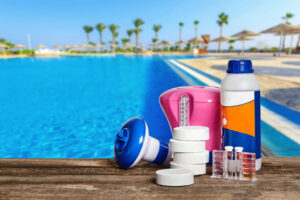
Choosing the right type of pool involves considering both the joys of pool ownership and the maintenance commitments each pool type carries. It’s essential to understand the factors affecting pool maintenance, from pool types and sizes to accessories and landscaping. While fiberglass pools are generally the easiest to maintain, each type has its own advantages and may be the right fit depending on individual circumstances. The key is to make an informed decision based on the insights provided in this comprehensive guide, striking the right balance between enjoyment and maintenance.
Further Factors
The Influence of Local Climate on Pool Maintenance
Local climate plays a role in pool maintenance. Warmer regions may encourage algae growth, requiring more frequent cleaning and chemical balancing. Colder regions require proper winterizing to protect the pool during off-seasons. Understanding how your local climate affects pool maintenance can help you prepare and plan accordingly.
The Role of Pool Usage in Maintenance Needs
How often and by how many people a pool is used also impacts maintenance needs. More usage means more cleaning and chemical balancing to keep the water clear and safe. Consider your expected pool usage when deciding on the type and size of your pool.
The Impact of Energy Efficiency on Pool Maintenance
Energy-efficient pool features such as variable speed pumps, solar heaters, and LED lighting can reduce energy usage and costs. However, they may have unique maintenance needs. Understand these before investing to ensure they fit into your maintenance plan.
Cost vs Maintenance: Finding the Right Balance
While the easiest-to-maintain pool types might have higher initial costs, they often result in lower long-term maintenance costs. Considering the cost versus maintenance equation will help you find the right balance that fits your budget and lifestyle.

